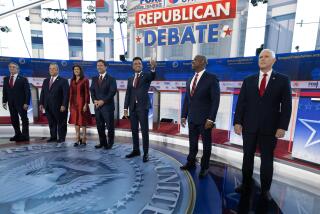No Longer Shoot-From-Hip Cowboy : Soviets Now View Reagan as a Trusted Man of Peace
MOSCOW — In the minds of many Soviet citizens, Ronald Reagan has gone from a shoot-from-the-hip cowboy threatening world peace with America’s military might to a grandfatherly neighbor and a man worthy of trust in the search for world peace.
In the last three years, President Reagan’s image here has undergone an even greater transformation than Soviet-American relations, and he will arrive here today on his first visit to the Soviet Union to a popular welcome that was inconceivable when he entered the White House in 1981.
Once reviled in the Soviet press as so madly anti-Communist that he unhesitatingly would destroy the world with a nuclear war to counter the Soviet Union, Reagan is now flatteringly portrayed as a man of realism and good will working with Soviet leaders to reduce international tensions.
A laudatory two-page profile in the current issue of a popular film magazine, Soviet Screen, describes the characters Reagan portrayed in his acting career as “really himself” and a man to be admired.
“He was always a man whom you could rely on--tough, strong and silent, a real man,” the profile says. “He had a feeling of justice and of duty, of common sense and of humor. . . . On the other hand, he was rather practical, conservative in the good meaning of the word, with solid habits and ideals. A patriot of his country, a good friend, a good family man.”
That image was enhanced in a television interview broadcast here Saturday evening in prime time just after the main news program.
Reagan’s conservatism, particularly his tough line on the Soviet Union in the past, are rarely mentioned here now--although less than four years ago he was denounced as a lunatic, a Nazi and a warmonger and mocked daily in cartoons.
“Confrontational and bellicose, a lunatic anti-Communist,” the official Tass news agency said after he called the Soviet Union an “evil empire.”
“Unprecedentedly hostile to the Soviet Union and dangerous to the course of peace,” Moscow said after his inadvertently recorded joke about preparing to bomb the Soviet Union was reported.
And his explanation of American reasons for intervening militarily in the Caribbean island nation of Grenada in 1983 were dismissed as springing from “the simple-mindedness characteristic of him.”
Vladimir Simonov, writing in the influential weekly newspaper Literaturnaya Gazeta last week, attempted to explain what he calls the “great paradox” of how a man so firmly opposed to communism came to deal with that “evil empire”--and to explain as well how the Soviet Union came to deal with him.
As President, Reagan has adjusted his anti-communism to fit reality, Simonov believes, but whether he has really changed is doubtful.
“The classic anti-Communist in Reagan is as ideologically unchangeable as is his suit size,” Simonov wrote. “He is only soberly taking account of the opportunities (that now exist thanks to) dramatically different conditions.”
Reagan seems to “swing between his two egos--the traditional one and the newly acquired one, like Dr. Jekyll who could not part with Mr. Hyde,” Simonov wrote, referring to the title characters in Robert Louis Stevenson’s classic horror story about a man with a split personality.
Sympathetic Portrayal
But Simonov’s portrayal of Reagan is warmly sympathetic overall, and he gives unusual details about how he rose from a poor background to be a multimillionaire as well as President.
Reagan today is a hero of modern America, Simonov concludes, noting his popularity even among people hurt by his policies. In his seven years as President, he has restored America’s faith in itself and in its future and helped it emerge from the period of “suffering” that resulted from the Vietnam War, Watergate and an economic recession.
“Reagan gave America back the faith that she could do a lot,” Simonov wrote. “He has given America what she was waiting for--optimism, faith in herself and heroes. . . .”
Georgy A. Arbatov, director of the Institute for the Study of the U.S.A. and Canada, said recently that Soviet leaders had to keep asking themselves which Reagan they were dealing with.
Sometimes his speeches were conciliatory, friendly, even warm, Arbatov said, but at other times they were “couched in the spirit of the worst times of the Cold War.”
“All the time you ask yourself, perhaps there are two presidents?” Arbatov remarked.
Change in Reagan
But Arbatov argued last week, on the eve of the summit, that it was Reagan who had really changed--but in response to new Soviet policies under Mikhail S. Gorbachev, general secretary of the Soviet Communist Party.
“The Reagan Administration has changed greatly in these recent years,” Arbatov said. “There were days when the Reagan Administration was on a very definite platform, when it refused to negotiate with the Soviet Union, when it insisted on positions of strength and said that (past) agreements were very shortsighted.
“He actually produced a program of achieving military superiority over the Soviet Union, called the Soviet Union an ‘evil empire’ and even broke off all contacts with us.”
And then reality set in, Arbatov said, and the Administration reversed course, renewed contacts and opened negotiations that have led to broad improvements in Soviet-American relations over the last three years.
“There is something symbolic that Reagan now comes with an olive branch to Moscow,” Arbatov said. “This is a new sign that the Cold War is outdated. And Reagan will be welcome in Moscow. We do not hold a grudge long.”
More to Read
Only good movies
Get the Indie Focus newsletter, Mark Olsen's weekly guide to the world of cinema.
You may occasionally receive promotional content from the Los Angeles Times.










